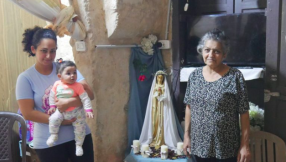
Last month we looked at five questions to ask yourself before dating again. If you missed them you can find them here.
Once you feel ready – or as ready as you're going to be – then go for it! Going for it involves getting yourself out there and meeting other single people. Ask friends or family to introduce you to suitable people, try internet dating and invite out anyone who you think you would like to get to know better. Also make sure you are following your dreams and living life to the full. That's because you are more likely to meet people who value the same things as you when you are actively pursuing your own passions. So, spend time doing the things that matter to you whether that is a sport, serving at church, a hobby, supporting a course, volunteering, travelling or something else entirely.
Now that you're ready, you've taken the plunge and have set-up or said "yes" to the first date – here are some things to bare in mind as you rejoin the world of dating:
1. Avoid sharing your emotional baggage on the first date
It's fine to mention that you have been married or have recently come out of a serious relationship but you might want to spare your date all the details. There will be plenty of time later on to share your history if and when a few dates turn into something more serious.
Avoid the temptation to bad mouth your ex – it may make you sound bitter and resentful and your date may worry that if they were to have a relationship with you that you will end up talking about them in the same manner. And endlessly talking about how brilliant your ex is won't help either. Your date may feel that they can't compete or that you aren't over your last relationship.
Try and keep things fun and light on the first date and enjoy getting to know the other person
2. Go at your own speed
Don't put pressure on yourself or let anyone else pressure you. Don't feel you have to get physically or emotionally intimate too quickly. Be clear if you are not ready. You may be longing to become close with someone again but bear in mind that sex creates a powerful bond and if it happens too quickly in a relationship it can easily "blind" you to any fundamental problems between you. There is a good reason why God designed sex for within the commitment and covenant of marriage. It is the joining together of two people at the most intimate level possible.
If you are keen to improve your chances of making a good choice, hold off getting pysically intimate until you know you really like the person, until you know you can trust them and until you have made a commitment to each other.
3. Don't lie or pretend to be anything you aren't
It may be tempting to re-invent yourself or to airbrush the past – but don't. Lies will catch up with you sooner or later. Besides, how would you feel if you discovered the person you were dating had made stuff up or had hidden the truth from you?
Be yourself and let your date meet the real you... not the person you think you should be or the one you think they would you like to be. After all, you don't want them falling for a fake version of you. You want someone who will like you for all you are, (and hopefully one day love you) – with your good bits, your not so good bits and your little quirky bits, all the things that make you, you.
4. Remember to stop at red lights
A red light is a 'deal breaker', whether it was on your list or not. Red lights are anything indicating that the relationship with this person is not going to work. Other examples might be: consistent lying, uncontrollable anger, physical or emotional abuse, untreated addictions, a constantly critical attitude, or if you find you stop 'being yourself' when you are around them.
5. Pray
God cares about all the details of our lives and our dating life is no different. Therefore, do pray about the process and also ask some trusted friends to pray with you and encourage you as you seek to make good and wise choices along the way.
And finally, enjoy yourself. Dating should be fun. It is an opportunity to get to know other people and to learn about them and about yourself in the process as well.
Don't worry or give yourself a hard time if you don't find Mr or Ms Right straight away. Be open, be yourself, follow your passions and don't put your life on hold waiting for 'the one'.
Love often comes when you least expect it.
Sarah Abell is the author of Inside Out – How to have authentic relationships with everyone in your life (Hodder 2011).
You can follow her on Twitter @thefabfish













